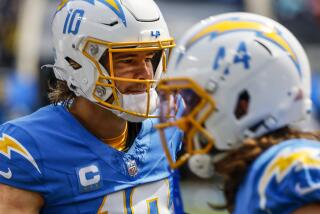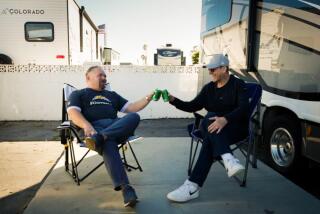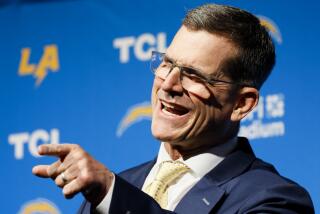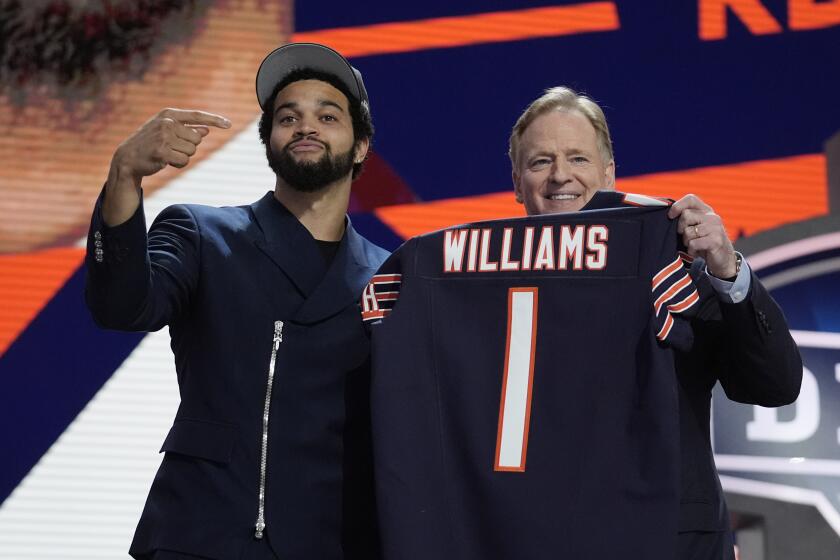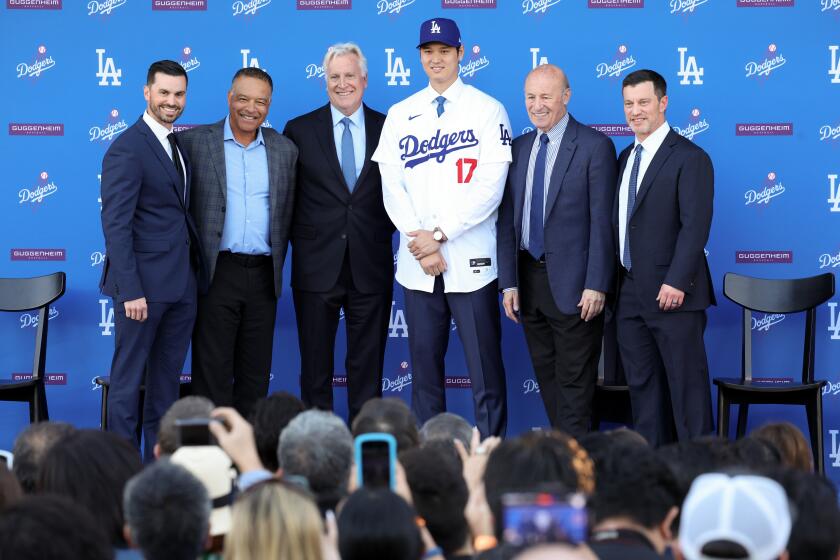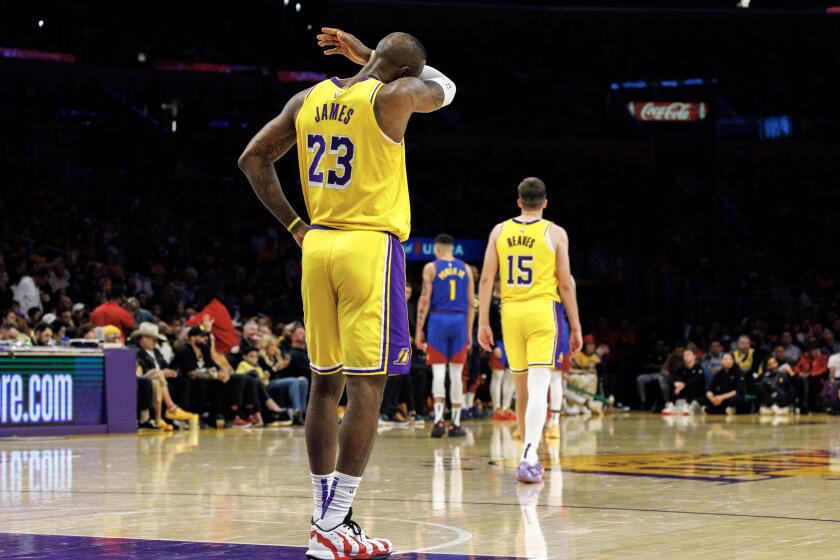49ers Coach Jim Harbaugh is a guy who shakes things up
Reporting from Santa Clara -- Jim Harbaugh is utterly comfortable with himself. This didn’t just come to light when he was hired in January as coach of the San Francisco 49ers, or before that when he turned around the Stanford football program. It was obvious during his career as a tough-minded NFL quarterback, and before that at the University of Michigan.
Rewind almost four decades, to when he was a 12-year-old kid who spent his free time hanging around the Wolverines’ players, practice field and locker room. He had free run of the place. His dad, Jack, was an assistant at the time under the legendary Bo Schembechler, coaching defensive backs from 1973 to 1979.
“In the room where the coaches dressed, there was a desk in the corner by Bo’s locker,” Jack recalled. “Bo and I walked in from playing racquetball one day, and Jim was sitting there tipping back his chair and he had his feet up on the desk. And Bo goes, ‘Jimmy! You got your feet up on my desk!’
“And Jimmy said, ‘Yeah, Bo, I do.’ He didn’t take his feet off the desk, and he didn’t put his chair back on all four legs.”
Schembechler paused, stared at the boy, then turned to the father.
“Jack,” he said, “there’s something about that kid I really like.”
Rest assured, the sixth-grader got pulled aside for a talking to. (Said Jack: “I told him, ‘Next time, get your damn feet off his desk!’”) But the retelling of that family story underscores how the second son of Jack and Jackie Harbaugh unflinchingly does things his way, even if some toes get crunched in the process.
It’s really no surprise, then, that Harbaugh didn’t rush to apologize two weeks ago after his over-the-top enthusiastic handshake and backslap of Detroit Coach Jim Schwartz. San Francisco had just force-fed the Lions their first loss, on their own field, and the postgame exchange between the head coaches nearly triggered a brawl.
Alienating people doesn’t worry Harbaugh, who says his older brother, John, coach of the Baltimore Ravens, is his only friend in the league. There’s no debating the formula is working for the 49ers so far. Heading into Sunday’s home game against Cleveland, San Francisco is 5-1, with the only loss coming in overtime against Dallas. The 49ers, who haven’t made the playoffs since 2002, lost their first five games under Mike Singletary last year on their way to a 6-10 finish, their ninth consecutive non-winning season.
In short, this five-ring franchise — which last won a Super Bowl at the end of the 1994 season — has thirsted for success. So there’s not a lot of hand-wringing in the 49ers locker room about Harbaugh’s unapologetic style.
“Most people might look at it weird, we look at it as a positive,” defensive tackle Ricky Jean Francois said of Harbaugh’s personality. “He’s crazy? Plus. He’s comfortable with the way he is? Plus. OK, we’ve got us a ball coach.”
Players say that contrary to his piano-wire-tight public persona, Harbaugh is at his most calm and composed when the pressure is highest, a quality that was obvious during his playing days when he earned the nickname “Captain Comeback,” a moniker given before him to Cowboys quarterback Roger Staubach.
“He’s the most intense head coach I’ve ever seen and I love it, because he’s very smart with it,” 49ers tackle Alex Boone said of Harbaugh. “Instead of being intense and crazy, he’s intense and gets into the game. He’s very dialed in at all times.
“The coaches that are phonies are the ones who when you’re down at halftime and they come in and they’re yelling at you and screaming. You’re like, ‘OK, what is you yelling at me going to accomplish? Nothing. Calm down.’ When we were playing Philly [and trailed the Eagles, 20-3, after two quarters], he came in at halftime and said, ‘Look, we’re going to play a little bit better, and we’re going to win this game.’ And that was it.”
After Philadelphia opened the second-half scoring with a field goal, the visiting 49ers scored three unanswered touchdowns to win, 24-23.
San Francisco is getting clutch play from its 11th-ranked defense, but also from running back Frank Gore, the NFC’s fifth-leading rusher, and quarterback Alex Smith, the former No. 1 pick many people thought the team would discard after last season.
Smith completed 13 of 17 passes with two touchdowns in the second-half comeback at Philadelphia, and in the victory at Detroit threw the winning six-yard touchdown pass to tight end Delanie Walker on fourth down with just less than two minutes to play.
“What I love about Jim is he’s an offensive-minded coach and he knows quarterbacks, and in this town that’s three-quarters of the work,” said Hall of Fame quarterback Steve Young, who won the 1995 Super Bowl with the 49ers. “I really love that he takes chances. He’s a bold play-caller, and you just don’t see many of those around the league.
“He calls a game to help Alex, and if Alex is playing well everyone is playing well. That’s the way Bill [Walsh] used to do it. Anything that looks like Bill Walsh, I’m excited about.”
Young has marveled at the turnaround of Smith, and Harbaugh’s role in that.
“Jim’s had to go from a standing start, with a quarterback who could get booed after three throws if he’s not careful, and manage that,” Young said. “There’s Alex Smith jerseys now. Alex Smith is a hero in town? That’s doing something.”
Harbaugh’s NFL playing career lasted from 1987 to 2001 and zigzagged to six franchises: Chicago, Indianapolis, Baltimore, San Diego, Detroit and Carolina. During his last eight seasons in the league, he moonlighted as an unpaid assistant under his father at Western Kentucky, scouting and recruiting high school athletes in his limited free time.
After retiring as a player, Harbaugh spent two seasons on staff with the Oakland Raiders, first as an offensive assistant, then quarterbacks coach. In 2004, he was hired as head coach at the University of San Diego, where he was 29-6, including consecutive 11-1 seasons in 2005 and ’06. There, he helped develop quarterback Josh Johnson, the first Toreros player selected in the NFL draft, a fifth-round pick of Tampa Bay in 2008.
Before Johnson, there was Todd Mortensen, who transferred to USD from Brigham Young in 2004, Harbaugh’s first season with the Toreros. Mortensen, whose career never got off the ground at BYU, would become the Pioneer League’s co-offensive player of the year and later had NFL stints as a reserve in New England and Detroit.
“I always felt it was a matter of, what Jim wants to do he’ll do and be successful at it,” Mortensen said. “If his ultimate goal was to end up in the NFL, then we felt like it was only a matter of time before the right opportunity came up and he’d be successful at that too.”
It was the stop in between USD and the NFL that truly put Harbaugh on the coaching map. He rebuilt a football team at Stanford that was 1-11 in 2006, the year before he took over. In four seasons, his Cardinal teams went 4-8, 5-7, 8-5 and 12-1.
“What he did at Stanford was borderline remarkable with the academic requirements that they have to get kids into that school,” said former NFL receiver Cris Collinsworth, whose son, Austin, reluctantly passed on a scholarship offer from Harbaugh to play for Notre Dame. “There were probably three-quarters of the top recruits in the country that he couldn’t even recruit. He was basing everything he did on a pretty limited number of potential applicants.”
That positioned him as football’s most coveted coaching candidate after last season, and, before he signed a five-year, $25-million deal with the 49ers, various projections had him landing with the Miami Dolphins or Denver Broncos, or at his alma mater, Michigan.
Handshake dust-up or not, the 49ers have absolutely no regrets about making that coaching change. That said, Harbaugh is the first to point out the season is merely six games old.
Asked about how he plans to keep his first-place team from getting complacent, he said: “We’re definitely worried about it. Dangers lurk, no question about it. The thing we just stress is keep climbing; we don’t want to hang on. Like a rock climber, it takes more energy to hang on than to keep climbing. That seems like the obvious thing to do.
“We’re not changing. We’re striving to improve.”
Harbaugh credits his dad and the late Schembechler, his college coach, for having a huge influence on who he is today. He vividly remembers a phone conversation he had with Schembechler in 2004 upon accepting the job at USD, recounting the talk in Schembechler’s clipped, drill-sergeant cadence:
“Are you gonna have a fullback? An ass-kicking fullback lined up right behind the quarterback?”
“Yes, Coach.”
“Will you have a tight end? A tight end that puts his hand in the dirt and seals the end line of scrimmage?”
“Yes, Coach, we’ll have a tight end.”
“OK. Good luck.”
Click.
Bo always did like that kid.
twitter.com/LATimesfarmer
More to Read
Get our high school sports newsletter
Prep Rally is devoted to the SoCal high school sports experience, bringing you scores, stories and a behind-the-scenes look at what makes prep sports so popular.
You may occasionally receive promotional content from the Los Angeles Times.
